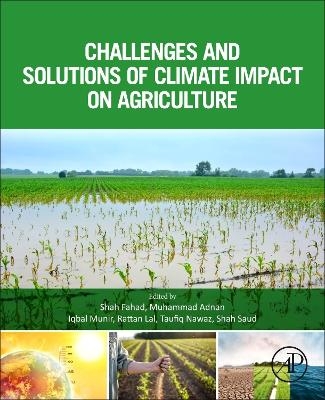
Challenges and Solutions of Climate Impact on Agriculture
Academic Press Inc (Verlag)
978-0-443-23707-2 (ISBN)
Dr. Shah Fahad is Assistant Professor in the Department of Agronomy at Abdul Wali Khan University. He obtained his PhD in Agronomy from Huazhong Agricultural University, China. He specializes in studying the effects of climate change and anthropogenic impacts on environmental health, agriculture, and food production. Within this focal area, he has published extensively on the role of cyanobacteria in sustainable agriculture and the risks harmful cyanobacterial blooms pose to aquatic systems. He has edited 17 books, including four titles with Elsevier. Dr. Adnan Works as lecturer at the Dept. of Agriculture, Univ. of Swabi. His research area is soil microbiology & plant nutrition. including FUE, sustainable nutrients (NP) management via organic manures and bio-fertilizers like rhizobia and PSB, N2 fixation by legumes for increasing cereal production, organic wastes management via composting and soil carbon sequestration for sustainable agricultural production and reduced greenhouse gasses (CO2, & N2O) emission. Post Doc (Biofuel/Lipid Metabolism)-Michigan State University, USA (2008-09); Post Doc (Enzymology)-Osaka Prefecture University, Japan (2003-04); PhD (Biotechnology)- Osaka Prefecture University, Japan (2000-03) Areas of specialty: Plant Biotechnology Enzymology) Plant Breeding. Research projects include sustainability of yield and soil fertility relating to crop rotation and incorporation of crop residues; screening of wheat genotypes under different levels of salt for yield and yield components; the role of biochar in mitigating ammonia and nitrous oxide discharge from urea fertilized wheat; impact of plant populations and nitrogen levels on maize. Rattan Lal, Ph.D., is a Distinguished University Professor of Soil Science and Director of the Carbon Management and Sequestration Center, The Ohio State University, and an Adjunct Professor of University of Iceland. He received B.S. from Punjab Agricultural University, Ludhiana; M.S. from Indian Agricultural Research Institute, New Delhi and Ph.D. from the Ohio State University. He served as Sr. Research Fellow with the University of Sydney, Australia (1968-69), Soil Physicist at IITA, Ibadan, Nigeria (1970-87). He has authored/co-authored near 900 refereed journal articles and over 500 book chapters, has written 20 and edited/co-edited 69 books. Dr. Lal is the past President of the International Union of Soil Sciences (2017-2018). Dr. Taufiq Nawaz obtained his PhD in molecular biology and biotechnology from South Dakota State University. His research focuses on the application of synthetic biology to cyanobacteria, which a specific focus on utilizing sunlight and nitrogen gas to create high-quality nutritional protein powder for human consumption. He seeks to pioneer innovative methods for biofuel production and the synthesis of high-value compounds. Dr. Nawaz has published extensively on the biology and ecology of cyanobacteria. Dr. Shah Saud is Associate Professor in Linyi University’s College of Life Science. He obtained his PhD in Horticulture from Northeast Agricultural University, China. Dr. Saud specializes in studying sustainable agriculture, soil, and water conservation in the context of climate change. Within this focal area, he has published extensively on the role of cyanobacteria in sustainable agriculture and the risks harmful cyanobacterial blooms pose to aquatic systems. Dr. Saud has edited three volumes with Elsevier.
1. Climate change induced environmental adversities and their impact on agricultural productivity
2. Climate change as a threat to global food security
3. Cereals production under changing climate
4. Impact of climate change on yield and quality of legumes
5. Disaster management and its impact on sustainable agriculture
6. Orchards management under changing climate
7. Impact of elevated CO2 and temperature on overall agricultural productivity
8. Sustainable soil management under changing climate
9. Climate change in interaction with global carbon cycle
10. Modeling climate change impact over soil productivity and agriculture
11. Modelling adaptation strategies to Climate Change in prospect of Agriculture
12. Soil and water conservation under changing climate
13. Climate change resilient crop production
| Erscheinungsdatum | 15.10.2024 |
|---|---|
| Verlagsort | San Diego |
| Sprache | englisch |
| Maße | 191 x 235 mm |
| Gewicht | 450 g |
| Themenwelt | Naturwissenschaften ► Biologie ► Botanik |
| Naturwissenschaften ► Biologie ► Ökologie / Naturschutz | |
| Weitere Fachgebiete ► Land- / Forstwirtschaft / Fischerei | |
| ISBN-10 | 0-443-23707-7 / 0443237077 |
| ISBN-13 | 978-0-443-23707-2 / 9780443237072 |
| Zustand | Neuware |
| Informationen gemäß Produktsicherheitsverordnung (GPSR) | |
| Haben Sie eine Frage zum Produkt? |
aus dem Bereich


